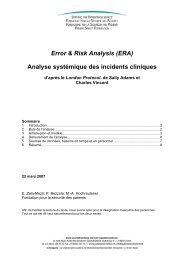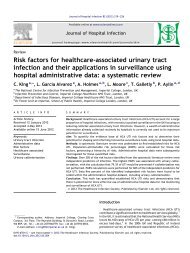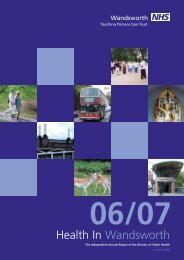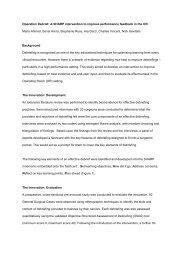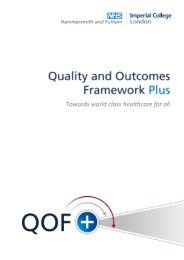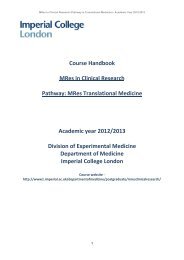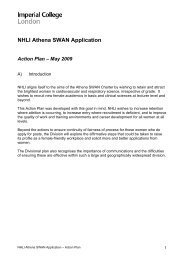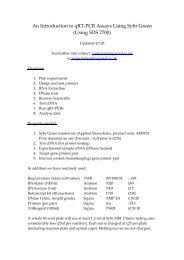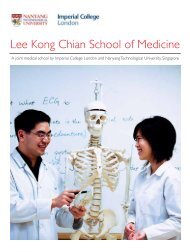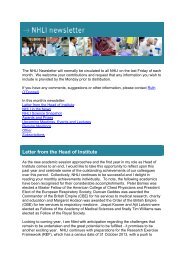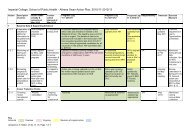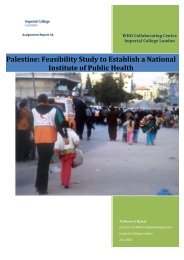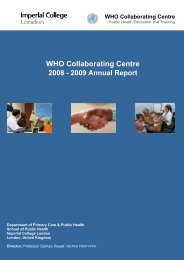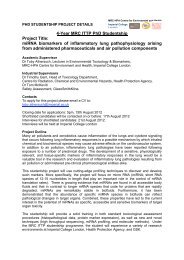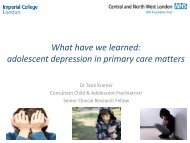APPLICANT - Imperial College London
APPLICANT - Imperial College London
APPLICANT - Imperial College London
Create successful ePaper yourself
Turn your PDF publications into a flip-book with our unique Google optimized e-Paper software.
the research programme according to their interests. During the clinical placement, the<br />
trainee will develop core competencies within the context of the healthcare management of<br />
newborn infants and their families, assist in teaching of undergraduate students and be<br />
involved in the research interests of the department. The Divisional research programmes<br />
are internationally competitive and in 2005, the MRC awarded funds to establish a MRC-<br />
Asthma UK Centre in Allergic Mechanisms of Asthma in partnership with Asthma UK,<br />
<strong>Imperial</strong> <strong>College</strong> and associated NHS Trusts. The associated F2 clinical attachments will be<br />
A&E and Paediatrics.<br />
Post 2 – Diabetes (Professor S Amiel) – based at KCH<br />
CODE: KCL/002<br />
F1<br />
F2<br />
King’s<br />
<strong>College</strong><br />
Hospital<br />
King’s<br />
<strong>College</strong><br />
Hospital<br />
General<br />
Medicine<br />
Diabetes/<br />
Endocrinology<br />
(Clinical<br />
Attachment)<br />
3m<br />
4m<br />
General<br />
Medicine<br />
Diabetes/<br />
Endocrinology<br />
(Academic<br />
Attachment)<br />
3m Trauma &<br />
Orthopaedic<br />
Surgery<br />
3m<br />
4m A&E 4m<br />
General<br />
Surgery<br />
3m<br />
The Diabetes Research programme has grown from observations of clinical problems in<br />
diabetes. Prof Amiel’s major interests are prevention of hypoglycaemia in Type 1 patients<br />
using intensified insulin therapy and the central control of metabolism in diabetes as a whole.<br />
We have used insulin clamping, cognitive testing and neuroimaging (positron emission<br />
tomography and functional magnetic resonance imaging) to understand the generation of<br />
symptoms in hypoglycaemia and find out what goes wrong when patients lose the ability to<br />
recognise when their blood glucose is low; to investigate the role of insulin resistance on<br />
appetite control and progression to obesity and Type 2 diabetes and the central actions of<br />
incretin-based therapies and of bariatric surgery. We have developed islet transplantation in<br />
the UK as a therapy for intractable hypoglycaemia and although this is now a clinical service,<br />
it supports a major laboratory-based research programme in islet physiology and function.<br />
We have a vigorous academic programme in mental health in diabetes which is currently<br />
investigating the impact of depression at diagnosis on outcomes in Type 2 diabetes and the<br />
role of “talking therapies” in improving diabetes control. Previous academic F2 posts have<br />
assessed a novel method for arterializing venous blood in neuroimaging studies; developed<br />
new protocols for assessing the brain’s response to food intake using fMRI; investigated the<br />
potential for on-line glucose monitoring to predict hypoglycaemia risk and studied the<br />
prevalence and duration of diabetes after liver transplantation. The associated clinical<br />
attachments are in general medicine is with the Diabetes and Endocrine firm, allowing<br />
exposure to specialist clinics in this field, while its primary focus is to ensure good F2 level<br />
training in hospital medicine and in the Accident and Emergency Department.<br />
Post 3 – Hepatology (Dr V Aluvihare) – based at KCH<br />
CODE: KCL/003<br />
F1<br />
F2<br />
King’s <strong>College</strong><br />
Hospital<br />
King’s <strong>College</strong><br />
Hospital<br />
General Surgery 4m General Medicine -<br />
Liver<br />
4m General<br />
Medicine<br />
Hepatology (Clinical 4m A&E 4m Hepatology<br />
Attachment)<br />
(Academic<br />
Attachment)<br />
4m<br />
4m<br />
The main focus of research in the laboratory is transplantation tolerance. This is divided in to<br />
2 areas:<br />
1. Characterisation of tolerance and rejection signatures on transplant patients using<br />
quantitative PCR (on candidate genes), microarray analysis and immunophenotyping.<br />
2. Tolerance inducing treatment strategies using regulatory T cells and additional<br />
immune modulation.<br />
www.stfs.org.uk/student/academic-programmes<br />
Email: tfsacademicrecruitment@stfs.org.uk<br />
Page 46 of 70<br />
Updated: 27 May 2010



